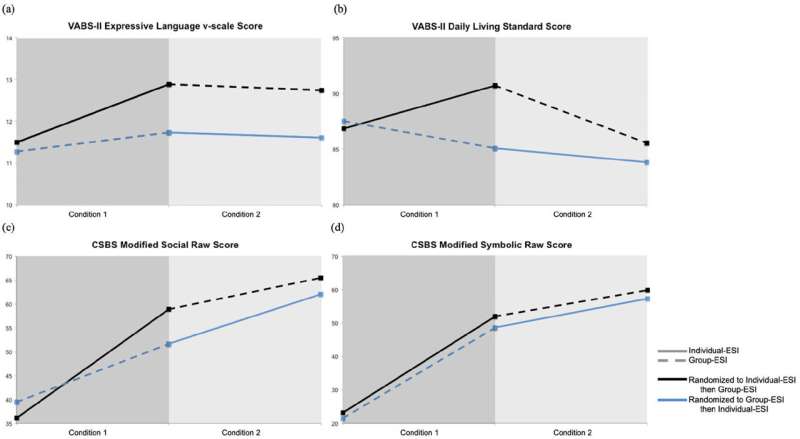This article has been reviewed according to Science X's editorial process and policies. Editors have highlighted the following attributes while ensuring the content's credibility:
fact-checked
peer-reviewed publication
trusted source
proofread
Earlier intervention leads to greater improvements in young children on the autism spectrum

Researchers from Children's Hospital of Philadelphia (CHOP), Florida State University, and the University of California, Los Angeles (UCLA) have demonstrated that starting a form of parent-led intervention for autistic toddlers earlier in life led to better gains in language, social communication, and daily living skills. This is one of the first trials to show the quantitative benefits of earlier intervention for an autism-specific intervention. The findings were recently published in the journal Autism.
While many prior studies have provided strong evidence for the benefits of early intervention in autism, many of these studies are correlation studies rather than objective, randomized studies that can provide stronger, more conclusive results. Additionally, prior research has not demonstrated an ideal age at which to begin interventions.
Researchers utilized the Early Social Interaction (ESI) model, a parent-implemented intervention for toddlers diagnosed with autism that provides a framework to guide caregivers in learning effective ways to support their child's development in social communication and emotional regulation. This model involves individualized coaching to help parents and caregivers implement evidence-based strategies into everyday activities in natural environments.
"Many of us in the autism community say earlier is better, but we do not actually have enough high-quality evidence for that, so a randomized controlled trial like this one helps address that issue," said lead study author Whitney Guthrie, Ph.D., a clinical psychologist with the Department of Child and Adolescent Psychiatry and Behavioral Sciences and the Division of Developmental and Behavioral Pediatrics and researcher at the Center for Autism Research at CHOP.
In this study, families were randomized to receive Individual-ESI intervention when the toddlers were either 18 months or 27 months old. A total of 82 toddlers and their caregivers participated in the multisite study, conducted at Florida State University and the University of Michigan. The toddlers in the study received both the individualized ESI intervention as well as the less-intensive group ESI intervention. The timing of the individualized intervention was randomized (18 or 27 months) to test for timing effects of this intervention.
The study found that children who received individualized ESI intervention earlier showed greater gains in use and understanding of language, social use of communication skills, and self-help skills. Additionally, the findings were specific to the intensive and individualized parent coaching model compared with the group-based treatment.
"While it is important to expand research include more children from a wider and more diverse community, our findings provide measurable evidence supporting earlier intervention," Guthrie said. "Our findings underscore the importance of a swift referral for evaluation if a child screens positive for autism or there is any professional or caregiver concern for autism. We want to make sure that toddlers don't miss this important window for earlier intervention."
More information: Whitney Guthrie et al, The earlier the better: An RCT of treatment timing effects for toddlers on the autism spectrum, Autism (2023). DOI: 10.1177/13623613231159153



















